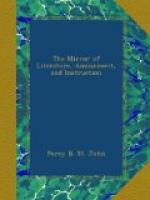The profession did not continue to maintain its rank. The disappointed author in “Roderick Random,” who set about writing for ballad-singers, was introduced into one of their assemblies, and his testimony establishes their degeneracy.
In fact, the history of ballad-singing, during the remainder of last century, affords but an unsatisfactory subject of reflection to lovers of song; whether they have regenerated in the present age, we leave the reader to judge.
E.J.H.
* * * * *
LOVE AT COURT AND LOVE IN THE COUNTRY.
Loving ’mongst the aristocracy
Is reckon’d positive hypocrisy;
The noble votaries of fashion
Are ignorant of the tender passion.
A shepherd, if his nymph doth alter,
Killeth woe by means of halter:
But in high life, if ladies prove
Indifferent to an ardent love,
What does the enamour’d title do,
But set about and alter too.
Translated from the French of Madame Deshoulieres.
* * * * *
NOTES OF A READER.
* * * * *
CORRUPT STATE OF THE WESTERN CHURCH IN THE ELEVENTH CENTURY.
From the following facts an inference may be drawn of the tendency of the Western church to a system of externals, applying itself solely to continual discipline and fasting, instead of the improvement of the heart. For the perusal of the sacred writings and spiritual lessons of the ancient fathers of the church, was substituted that of legends and decretals, and the Book of Canons, by which the whole Western church was governed. Images and relics of the saints acquired an excessive adoration; and continual discoveries were being made of the bodies of miracle-working saints. Impostors were to be found, appearing every day under new names and with fresh miracles, imposing on the credulity of the public, and amassing wealth by defrauding the pious multitude. Some of these impostors, too insolent in their practices, were discovered and punished, whilst others derived from them their whole fortune and subsistence. It went to such a pass, that an arm of St. Augustine was found and sold to William, Duke of Aquitaine, for 100 talents. The head of St. John the Baptist was dug up, and attracted an immense multitude of spectators, amongst whom was Robert, King of France.[3]
[3] “One head of St. John the Baptist (for there are many, and John was at last [Greek: ekaton ta kephalas],) was found at the monastery of St. John of Angeli, at Saintange.”—Jortin’s Remarks on Eccles. Hist. ann. 1010.
The principal supporters of this religious mania were the Crusaders; that is to say, those persons who went on a pilgrimage to Jerusalem. These persons, on their return to their own country, finding all their




